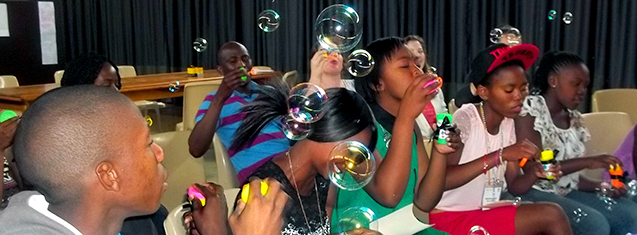Latest News Archive
Please select Category, Year, and then Month to display items
12 January 2024
|
Story Nonsindiswe Qwabe
|
Photo Sonia Small
 Since joining the UFS in 2008, Dr Grey Magaiza has worked extensively on approaches that can foster the socio-economic transformation of societies.
Since joining the UFS in 2008, Dr Grey Magaiza has worked extensively on approaches that can foster the socio-economic transformation of societies.
“The future should be one where communities can decide on their development agenda and futures. That’s the most important for me.” Dr Grey Magaiza, Deputy Director of the Centre for Gender and Africa Studies (CGAS) and Head of the Community Development programme on the Qwaqwa Campus, is passionate about capacitating communities to be agents of change and advancement. His vision for the future emphasises the empowerment of communities to take charge of their development by actively participating in decision making and the implementation of development projects that can improve their lives.
Since joining the UFS in 2008, Dr Magaiza has worked extensively on approaches that can foster the socio-economic transformation of societies. Over the years, he has crafted his research speciality into one that he is most proud of – being an interdisciplinary scientist immersed in the development of communities.
“I’m in a fortunate position of researching what I like. I say ‘fortunate’, because I’ve taken the time to understand what I’m passionate about, which is the overall field of rural livelihoods and livelihood futures – in short, community development. My research starts from an engaged university, understanding the elements that a university must use to enhance transformation and relevance to its immediate community in terms of development.”
One of the ways he has done this is by looking at social entrepreneurship as a development approach for young people in a rural setting. Through workshops with non-profit and civic organisations in Qwaqwa, Dr Magaiza has been helping these organisations to map out their needs and actively meet them through the involvement and support of external role players.
“We understand that communities are part of the national development agenda, but even that national agenda respects community knowledge and intentions and allows communities to shape their identity. A critical enabler of this is community organising. You bring back the capacity in communities to have dialogues on issues affecting them as spaces for engagement, knowledge exchange, and for people to just talk about their way forward.”
By enabling communities to define their development agenda, they can address their specific needs, challenges, and aspirations, he said. “When I look at livelihood futures, it’s quite an exciting aspect of my work – it’s like looking into a fortune tellers’ globe, because you’re not deciding for communities what they should do, but the communities themselves take those decisions.”
Digital Storytelling empowers and liberates students
2014-10-17

In January 2014, Jode Brexa, an American Fulbright scholar, came to our university and moved into the guest room at Welwitschia residence.
It so happened that Brexa and Elize Rall, residence head of Welwitschia – better known as Wel-Wel – started talking about digital storytelling. Brexa’s Digital Storytelling project captured Rall’s imagination. Shortly thereafter, Brexa convinced the RC members of Wel-Wel to participate in the project.
Digital storytelling is, on the most basic level, the use of computer-based resources to tell stories. The idea is to combine the art of storytelling with multimedia – including graphics, photos, text, audio, image and/or music.
The Wel-Wel students were taught storytelling skills and each student’s unique story was recorded and edited. It was so successful that they then showed their stories to the Rector and Dean of Students. Brexa will now – with their permission – take their stories to America with her, where she will share it with her community.
During the weekend of 10–12 October 2014, the RC of Wel-Wel introduced 12 learners, who are currently in Grade 10 at the Christiaan Liphoko School, to the project. The learners stayed in the gazellie for the weekend and, in the course of a few days, learned how much power is locked up in their personal stories. They learned that everyone’s story has the power to inspire and empower.
Wel-Wel has been involved in various outreach projects to the community. However, this was the first time that Wel-Wel literally brought the community to their doorstep. This is also not a charitable project. It is uplifted students reaching out to the youth to empower them in order to empower others in turn.
Meanwhile, Brexa also linked the project to the university’s Schools Partnership Project. The programme works through mentorship programmes to uplift previously disadvantaged schools. Hands were also taken with Columba Leadership NGO – financed by Old Mutual.